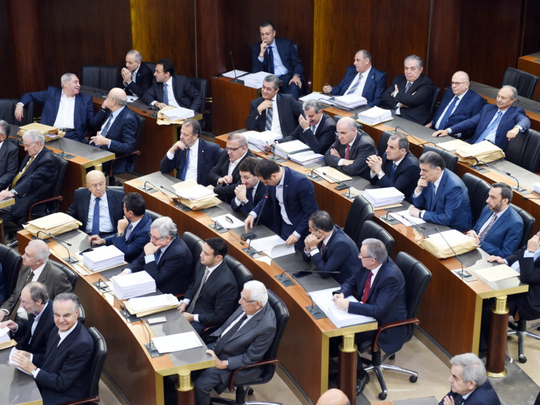
Beirut: Although Progressive Socialist Party (PSP) leader Walid Junblatt lamented some of the decisions reached by Lebanese parliamentarians during their Thursday extraordinary session because, allegedly, they were “too costly at all levels,” Beirut hunkered-down and invested in its critical security capabilities.
According to the PSP leader, deputies may have committed an egregious act when they voted to allocate $1.5 billion to equip the army and, in the process, “exhausted all efforts, capabilities and the capacities of the human mind.” Junblatt asserted in his weekly Al Anba’ online magazine editorial that the strenuous negotiations and political wrangling that eventually secured the convention of the parliament were not adequate.
“We innocently ask why weren’t these supplies listed as part of the $1 billion Saudi grant whose implementation is being overseen by former Prime Minister Sa’ad Hariri or the $3 billion Saudi-French agreement in order to spare the treasury additional expenses,” he explained.
His concern, consequently, focused on the alleged reasons why various parliamentary blocs “disregarded the dramatic rise in public debt, which has started to threaten the financial foundations of the entire state.
Notwithstanding this lamentation, Beirut recently boosted its meagre capabilities after the Lebanese Armed Forces (LAF) purchased six A-29 Super Tucano turboprop attack planes to bolster their counter-insurgency capabilities, to be delivered starting in January 2017.
The deal with Brazil’s Embraer was announced at the November 2015 Dubai Air Show and includes logistics support as well as a complete training system for Lebanese air force pilots and mechanics.
The heavily equipped A-29 Super Tucano — 70mm rockets, air-to-air and laser-guided missiles — retails for $14 million each and will apparently be built at Embraer’s Jacksonville, Florida plant, although the total value of the deal will probably reach the half-a-billion mark because of a major logistical upgrade. Interestingly, the aircraft’s popularity is chiefly due to its versatile handling as a light attack aircraft, as well as an effective reconnaissance and close air support platform for ground troops.
The Lebanese air force, which used to fly Mirage fighters five decades ago, has only three fixed-wing attack aircraft, the famed Hawker Hunters that were first introduced in 1958, though they seldom take to the sky. In addition, three ancient Bulldogs act as trainers, although most of the 1,600 personnel in the service concentrate on helicopters, which number about seventy. In 2014, the United States transferred three AC-208B Combat Caravan fixed-wing turbo-prop platforms equipped with Hellfire missiles, to conduct intelligence, surveillance, target acquisition, and reconnaissance missions.
According to public sources, Washington provided the LAF with more than $1 billion in military assistance over the past eight years and, in 2014, the Kingdom of Saudi Arabia announced a $3 billion plan to provide the LAF with French-made weapons even if local politicians delayed implementation for various reasons. High-ranking Lebanese officials complained of delays though it was unclear why Paris was slow to fulfil various requests prepared by the LAF’s experts as to their immediate needs.
In the event, Riyadh added another billion dollars to the pot for emergency anti-terrorism equipment as Lebanon confronted increased threats along its border with Syria from extremist groups, as a stop-gap measure. In the aftermath of the post-2011 Civil War in Syria, and Hezbollah’s decision to deploy its militiamen to fight in the neighbouring country, the LAF has conducted frequent battles in Northern Lebanon, especially around the besieged city of Arsal, where the Syrian Civil War spilled over inside the country.












